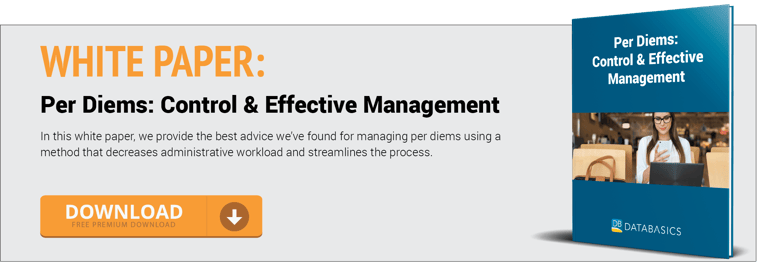
Can You Afford Healthy Food On A Per Diem?
Per diems can be a smart way for a company to easily manage the cost of food for travelers. Paying the employee per day at a set rate reduces the administrative cost of filing and approving expense reports, a major benefit for companies with a lot of travelers. Plus, per diems allow for easier budgeting.
Can Per Diem Meals Be Healthy With Current Per Diem GSA Rates?
There are plenty of variables to consider when trying to ascertain the appropriate amount to provide to employees per day. There’s always the GSA, which provides per diem rates based on location, but even those rates can be too little, especially when considering the cost of healthy food, not only in the cost of ingredient, but also in the time to make that healthier food. Of course, some employees will hoard their per diem in an effort to make money off of their travel for the company (and that’s their prerogative). The result is that these travelers are probably not making the best decision for their health, especially if they travel long-term.
stresses over the long-term needs of their body and their health.
Tips, some good and some bad, for eating cheap while traveling are easy to come by all over the internet. Suggestions for cheap food include taking double advantage of free hotel breakfast by saving a banana, apple, or yogurt for lunch. Other suggestions are stopping by the grocery store to pick up bread and peanut butter for sandwiches or even eating room-temperature beans out of a can. An even worse suggestion is eating off the dollar menu at a fast food restaurant.
On the other hand, those employees who want to use their meals & incidentals per diem for its intended use might find that eating healthy on the go can be a real challenge. One suggestion for healthy food on the go that’s often heard is a stop by Chipotle, but eating the same thing for every meal probably isn’t going to work out.
According to a 2015 article titled “A Darker Side of Hypermobility,” frequent business travelers get “fewer opportunities for physical exercise, [and have] worse eating habits than when at home.” It seems that travelers are often more concerned with their immediate work-related stresses over the long-term needs of their body and their health.
Related Article: 2024 Per Diem Rates & Mileage Rates Updated
Contrary to popular belief, healthy food doesn’t have to cost more. A recent article from organics.org made an important distinction between healthy and unhealthy food: “When you ask ‘why is the price of healthy food so damn high?’ you are asking the wrong question. Instead, ask ‘why is the price of unhealthy food so damn cheap?’… Don’t assume that more expensive or organic items are immediately better in every way, but also don’t assume that healthy products are actually more expensive.”
energy to acquire, two commodities they don’t have in excess.
The trouble is that healthy food takes more time and energy to acquire, two commodities that travelers don’t have in excess. So, if the company is paying a per diem, it can make sense in travelers’ minds to go for the food that takes less work to get.
One interesting suggestion for encouraging employees to eat healthier comes from Catherine Richards, an associate director of a healthcare analytics company. Richards suggests using a “carrot and stick” approach: “If the company reimburses employees for meals while traveling, reimbursement rates could be tied to dietary quality. A ‘stick’ approach might be to reimburse high–energy density food meals at a below cost rate, while a ‘carrot’ approach might be to reimburse healthy meals at an above cost rate.”
The challenge of Richards’s suggestion is that paying out more for healthier food will also cost more in administrative costs. It takes extra effort by both travelers and administrators, which seems contrary to the primary purpose of a per diem in reducing administrative costs and time.
utility in reducing the impact of business travel on health," says Richards.
Plus, how would someone go about reporting which food they ate for a higher reimbursement? And how does a company prevent someone from abusing this policy? And, on an even higher level, what about the issue of privacy? It’s a good practice for employees to make their own decisions about their health and their bodies and for their employers to stay out of it. The notion of rewarding good choices sounds good from a wellness perspective, but there are definitely more possible pitfalls than rewards for any company that takes this approach. Plus, employees who eat healthier food are already reaping the benefits of feeling better overall.
Instead, it might work out better to follow Richards’s other advice: provide resources for employees to decrease the health consequences of travel other than those associated with food. “Given the link between business travel and work stress and between stress and diet and obesity, stress management classes and workshops may have utility in reducing the impact of business travel on health.”
In the end, the answer to whether it's possible to afford healthy food on a per diem budget is "yes." However, that "yes" has some qualifications. Finding healthier food takes more time and more work; this means that supporting employees in being healthy might be a matter of reducing the overall stress of the business trip whenever possible. Of course, delayed flights and high-pressure meetings with clients are some major stressors that might not be preventable. However, arranging a schedule that allows employees the time to find and make healthier food along with booking lodging with options for making that food can go far. These are small steps that employers can take in support of their employees' health.
For more information on the DATABASICS Time & Expense solutions, contact us, or call (800) 599-0434.
DATABASICS provides cloud-based, next generation Expense Reporting, P-Card Management, Timesheet Management, Leave Management, and Invoice Processing automation. Specializing in meeting the most rigorous requirements, DATABASICS offers the highest level of service to its customers around the world.
DATABASICS is relied upon by leading organizations representing all the major sectors of the global economy: financial services, healthcare, manufacturing, research, retail, engineering, nonprofits/NGOs, technology, federal contractors, and other sectors.
Connect with DATABASICS: LinkedIn, Twitter, and YouTube. DATABASICS is headquartered in Reston, VA.
Subscribe to our blog
Recent Posts
Posts by Topics
- Expense Management Software (130)
- DATABASICS (69)
- Time Tracking Software (47)
- Leave Management System (26)
- P-Cards (9)
- Home Healthcare (8)
- Government Contractors (7)
- Nonprofit Organizations (7)
- International Development (6)
- Receipt Management (6)
- Advanced OCR (2)
- CROs (2)
- Staffing Agencies (2)
- Vendor Invoice Management (2)
- Audit Management Software (1)
- Construction (1)
- Field Service Management (1)
- Integration (1)
- Microsoft Dynamics (1)
- Oracle NetSuite (1)
- Partnerships (1)
- Professional Services (1)
Read on

Expense Fraud Isn’t New Because of AI; It’s a Systems & Operational Problem
Read Now
Enhancing Employee Experience with Mobile Expense Management
Read Now
Maintaining Compliance with Mobile Expense Management Tools
Read NowSeamless Integration of Time Tracking and Payroll
Read Now
Seamless Migration from Nexonia: Unified Time and Expense Solutions
Read Now
Nexonia Migration: The Best Alternative for Timesheets & Expense Management
Read Now
Subscribe to Our Blog
Subscribe to our blog and get the latest in time tracking and expense reporting news and updates.
